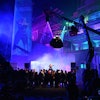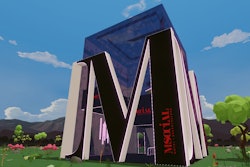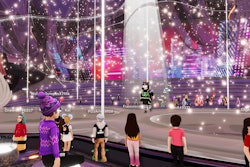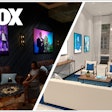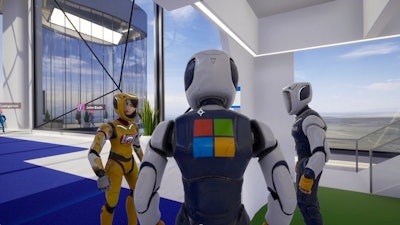
If you’re someone who keeps up with event-industry trends, it’s likely you’re seeing the word “metaverse” popping up everywhere lately. There’s a metaverse fashion week coming up in March. The Australian Open is planning a tournament-long metaverse gathering for fans. One tech-savvy couple even got married in it recently.
While event producers are still recovering from the whirlwind of pivoting to virtual, new technologies like NFTs and holograms and cryptocurrencies and, yes, the metaverse, are uprooting the industry once again. It’s understandable if your head is spinning a bit.
Simply put: The metaverse is a collection of virtual, 3D worlds, where people create their own personal avatars to explore across different platforms. The term was initially coined by author Neal Stephenson in the 1992 novel Snow Crash, but has found newfound, widespread popularity after Facebook announced that it would rebrand as Meta. To Meta founder Mark Zuckerberg and other metaverse proponents, the ultimate idea is a sort of second digital life for everyone to live online.
In an ideal scenario, the technology will allow you to feel like you’re physically at the event, with high-definition, 3D environments you can access via virtual-reality goggles, as well as other avatars you can walk up to and interact with and even physical items you can pick up and examine with haptic gloves or game controllers. While technology that extensive may not fully exist yet—or at least, may have too big of a barrier to entry for the average event attendee—plenty of tech companies and virtual event platforms have already begun creating their own, more low-key versions of the metaverse.
So is this really the future of events, or just the latest technology buzzword? There certainly seems to be an appetite for this type of model when you look at something like Epic Games’ "Fortnite" video game, which in April 2020 saw a whopping 12 million fans create avatars and gather in a virtual space to watch rapper Travis Scott perform—also as an avatar. Just last month, Microsoft co-founder Bill Gates predicted that within the next two to three years, most virtual meetings would “move from 2D camera image grids … to the metaverse, a 3D space with digital avatars.”
Lachlan Phillips, CEO of Orbits—which calls itself “a metaverse company that specializes in virtual events and venues”—agrees with that sentiment. “The impact of metaverse on events and meetings will be similar to the impact email had on snail mail,” he boldly proclaims.
BizBash chatted with Phillips, as well as six other event producers who are well-versed in the metaverse, about what this all means. Here’s how they answered some of our most burning questions.
Realistically, do event planners need to be thinking about the metaverse yet?
While Bill Gates’ dream of widespread adoption of the metaverse for events and meetings is likely quite a ways off (if it comes at all), our experts say it’s absolutely something that needs to be on your radar, particularly if you have a role in planning virtual gatherings.
“Twenty years ago, no one was planning online events. And certainly, we saw very few online events even a few years ago. But then, in a matter of weeks, we saw a complete transformation of the field to online-first,” notes Lee Gimpel, founder of Better Meetings. “I think it’s folly to say that we’ll return to an era where the majority of events are in-person. What the metaverse is and what it looks like is still up for debate, but I don’t think there’s much debate that online events will continue to grow, thrive and evolve.”
Of course, this doesn’t mean that events will shift entirely to virtual reality by, say, this time next year, Gimpel clarifies. The technology that supports them will be improving and changing with time, and “we’ll likely see a steady progression to more immersive platforms each year.”
Valerie Bihet, owner of event production company VIBE Agency, argues that the event industry is “entering a world that is totally digitized, and having a digital entity in your event is a must.” She notes that this shift to the metaverse is a natural one triggered by the rise of video games and avatars on platforms as widespread as Snapchat. “We have already seen how big of an impact Snapchat and its custom avatars have had on people. They like to create their own personalized avatar, to the point that its use has moved beyond that one app and you can now use it in chat functions and on social media,” she points out. “That love for avatars and the evolution of them has led to the metaverse.”
How does this differ from the virtual events we’ve all been planning for two years?
It’s essentially a further evolution of the digital events and meetings many of us attend every day, and a lot of virtual platforms already embrace many metaverse concepts like avatars. Jennifer Best, vice president of marketing at speaker bureau All American Entertainment, says that the metaverse will “transform the way we meet by remedying the number-one grievance event planners have about virtual events—that current virtual event platforms do not allow for the level of engagement they desire at their events.”
Best argues that chat boxes and breakout rooms can only take events so far, and that by incorporating key metaverse components like virtual reality, augmented reality, 3D holographic avatars, video and more, users can be more fully immersed and interact with each other in more authentic ways. “The benefits of meeting in a virtual reality setting will include business meetings and conferences where networking can actually take place by the ‘virtual coffee stand,’” she explains.
Phillips adds that the metaverse has crucial benefits for hybrid events in particular. “There will no longer be a clear divide between those who attend in person and those who attend virtually,” he says. “When we host a hybrid event on Orbits, the MC speaks to the live audience and the virtual audience as if it was one big auditorium, and no matter where you are on the planet, you're able to interact with speakers, attend Q&As and workshops, participate in specialized experiences or simply bump shoulders with people in the bar.”
He sums up, “The metaverse is a fundamental shift in the way we interact as people.”
What types of events would this work best for?
In short: Anything! In addition to fashion shows and sporting events and weddings, the concept got a big boost from South by Southwest’s virtual edition in March 2021. Organizers teamed up with VRChat and VRrOOM to create a digital rendition of downtown Austin, explorable via desktop PCs or VR headsets. The experience recreated classic SXSW venues like River Red Street and The Paramount, and attendees could “walk” the streets and visit various venues for events and panels.  SXSW Online XR also featured gamification elements like ax-throwing, go-karts, arcades and even virtual beer pong. See more: 6 Steal-Worthy Event Strategies From SXSW's First Virtual EditionPhoto: Courtesy of SXSW
SXSW Online XR also featured gamification elements like ax-throwing, go-karts, arcades and even virtual beer pong. See more: 6 Steal-Worthy Event Strategies From SXSW's First Virtual EditionPhoto: Courtesy of SXSW
A more obvious use will be for virtual work and meetings. Facebook's parent company Meta, for example, has already created Meta Horizon Workrooms, a virtual meeting space where colleagues join as an avatar with a VR headset. Microsoft offers something similar called Microsoft Mesh.
But Elle Chan, founder of Trademark Events, cautions against adopting the concept just for the sake of novelty. “Meta events that will be successful are also ones where the audience will be accepting of the whole notion of engaging in virtual reality,” she says. “Meta events that target incorrect audiences, just for the novelty, will fail. The rules of engagement in the environment and how it works are completely different—so in turn, marketers will need to throw away their rulebooks and evolve new ways to communicate.”
For her part, Best thinks that the metaverse can have a great impact on events centered around keynote speaking sessions. “The format allows speakers to go beyond current audiovisual capabilities and take attendees on an immersive and memorable journey,” she points out. “In the right setting, this can be an incredibly impactful experience for brands and organizations.”
Bihet, meanwhile, sees a use for it in places like the fashion industry. “You can showcase products and the collections in the metaverse world before actually creating them in real life, giving you the opportunity to gather upfront feedback, then customize and/or change them as needed,” she says, adding that products can be displayed as 3D models rather than just photos or renderings. “The metaverse can really revolutionize the way we bring products to the market.”
But the main benefit, says Phillips, is bringing people together in new and innovative ways. “In our experience, the events [the metaverse] works best for are events where you want to build a community, a shared identity,” he says. “A conference might want to build a community around ideas, a brand might want to build a community around aesthetic or cultural values, an association or religious group might want to build a community around values. … An event is when two people share an experience with one other. If you can deliver your content by livestreaming it to a passive audience, the event needn't be on the metaverse.”
Why are so many event planners so excited about this?
1. The metaverse can easily accommodate attendees all around the world. “In the metaverse, you can hear someone having a conversation just as if they were in the next room to you, even if they are far away or across the world,” says Bihet. “All it takes is getting your avatar closer to them the same way you would walk by someone in life.
Gimpel agrees. “So many events are driven by businesses making a decision to send their employees to conferences. Those are big costs—registration, travel, lodging, dining—for often questionable ROI,” he notes. “Given this in-person model versus having employees teleport to an event in the metaverse for relatively little cost, the bean counters in finance may really push the adaptation to an online world.”
2. With avatars, attendees can present themselves however they’d like. “You can completely reinvent yourself and be anyone you want to be,” says Chan. “There is an opportunity for limitless creativity. You won’t be bound by gender, physical limitations, race, age or sexual preference, which means racism or discrimination can be disempowered in that environment.”
3. It allows for unique event experiences and new opportunities for engagement. “The world is literally opening up to you,” says Bihet. “You can create the option for people to travel all over the world through your metaverse if you design it as such. You can show people what Paris looks like, or the northern lights in Alaska without having them leave their homes. And you can design it and then use these as meeting spaces for attendees and still be able to talk live to each other attendees as if they were with you in that same physical space.”
“Engagement is the beating heart of driving meaningful connections, so by whatever means necessary, that’s what we’ll do,” adds Alisa Walsh, CEO of event agency Haute, about why her company is embracing the idea. “Smart event and creative agencies are already considering how they might add this new opportunity into their tech stack to provide alternatives for remote/virtual experiences. We know that the Metaverse is transformative and next level, and there’s so much possibility that it’s easy to get excited.”
4. You aren’t limited by venue and vendor availability. “You can create any type of experience you want and aren’t limited by what venues are available for your chosen date,” points out Bihet. “You just create the venue you want. The same can be said for the level of decor and design you want. Vendor inventory does not limit you in the metaverse the way it does in the physical world.”
5. It could open up revenue streams from a new type of event attendee. “The metaverse opens up a totally new dimension,” says Chan. “Just as virtual and in-person models coexist, so too will metaverse event models.” She notes that while the metaverse may not necessarily replace existing events, it’ll draw a specific audience of early adopters who are ready and eager to engage with it. “There is incredible potential for us as marketers to reinvent how we reach, engage and appeal to those audiences in a whole new reality where companies can generate revenue in new ways.”
![“In our experience, the events [the metaverse] works best for are events where you want to build a community, a shared identity. A conference might want to build a community around ideas, a brand might want to build a community around aesthetic or cultural values, an association or religious group might want to build a community around values,” says Lachlan Phillips, CEO of Orbits.](https://img.bizbash.com/files/base/bizbash/bzb/image/2022/01/The_Design_Conference___Bespoke_Festival___Orbits.61e9cfc566b64.png?auto=format%2Ccompress&fit=max&q=70&w=400) “In our experience, the events [the metaverse] works best for are events where you want to build a community, a shared identity. A conference might want to build a community around ideas, a brand might want to build a community around aesthetic or cultural values, an association or religious group might want to build a community around values,” says Lachlan Phillips, CEO of Orbits.Photo: Courtesy of Orbits
“In our experience, the events [the metaverse] works best for are events where you want to build a community, a shared identity. A conference might want to build a community around ideas, a brand might want to build a community around aesthetic or cultural values, an association or religious group might want to build a community around values,” says Lachlan Phillips, CEO of Orbits.Photo: Courtesy of Orbits
Sounds great! What are the downsides?
1. There’s a barrier to entry that might alienate some attendees. “Marketers need to know that they’ll be restricted by whether or not their intended audiences have access to [hardware like VR headsets], and are comfortable using technology and interacting remotely within the metaverse,” says Chan. “If [your audience will] happily engage there, create a meta event that will blow their minds. If they’re not comfortable with it, skip meta and create an equally mind-blowing traditional event.”
2. Planners will need to rethink their budgets. “These emerging technologies are certainly going to add more excitement and buzz to the industry—so long as the cost and complexity to implement them is not a barrier for most organizations' budgets,” notes Best. “Many budgets are already strapped because of the increased cost of implementing hybrid formats. While virtual-reality headsets, augmented-reality glasses, smartphone apps and other devices will all enhance engagement at events, these technologies do come at a cost.”
3. The planning process can be complicated and time-consuming. “When you are creating a metaverse experience, there are bound to be a lot of bugs because it’s a full 3D construction project,” points out Bihet. “This means you need to do even more testing and approach it like a software developer would before releasing a new app or program. Test all of the various ways an attendee could move around to make sure nothing goes wrong in any room or at any engagement point. This is very time-consuming, and really needs an experienced developer to lead.”
4. Certain aspects of the attendee journey will need to be rethought. What works in person may not necessarily work in the metaverse, caution our experts. For example, metaverse planners may need to thoughtfully build in areas for private conversations. “As people move around the metaverse, just as they would move around an area or a room, they will hear and see the things happening and hear their avatar,” explains Bihet. “This can be great for a more real-life kind of experience, but if you want people to have private conversations, you need to set up for that or be clear that attendees should assume they are in a public space just as they would be if they were face-to-face. Technologically, you can create private spaces anywhere, but you clearly need to communicate how this is structured and how to use the feature.”
And for hybrid events, adds Chan, the metaverse doesn’t naturally allow much interaction with in-person attendees unless you put in the extra effort during planning. “It’s a bounded virtual reality, so people who are in the metaverse are not going to be engaging much with people who are in person at an event,” she says. “People tend to immerse themselves in the environment that they choose.”
5. Attendees crave a balance between digital and analog experiences. There’s certainly an element of screen fatigue right now, notes Walsh. “Let’s face it, we’re all on screens far too much. Meeting in a setting that is created by technology, as fantastic as it is, can’t replace the energy and the feelings of in-person face-to-face interaction,” she says.
Austin Johnston, founder and CEO of AKJOHNSTON Group, thinks that there needs to be a healthy balance between online and IRL experiences—and that event professionals should lean into their strengths and passions. In a recent guest column for BizBash, he wrote: “The more digital we get, the more we crave balance to satisfy the human experience and emotion that we so desperately need. We look at our clients and their needs and desires, then I look at our capabilities and where we really shine. For AKJOHNSTON, we are going to confidently stay in our lane, certain that the more digital grows into the big shoes that the metaverse no doubt needs to fill, we plan to continue to grow without touching one pair of Oculus goggles and, instead, creating highly valued consumer experiences in real life.”
So for companies and clients that do embrace the metaverse, will it ever fully replace face-to-face meetings and events, like Bill Gates predicts?
Most of the experts we spoke with agree that there’s no substitute for face-to-face. “It’s all a question of balance,” says Bihet. “If you have too much metaverse, you will kill it—the same way Zoom seemed (and was) a wonderful way to meet at the beginning of the pandemic, we then hit Zoom fatigue.”
Phillips sees great potential for the metaverse particularly in the world of remote work and meetings. “For any interaction, there's a tipping point at which the gravitas of meeting in reality is eclipsed by the convenience of meeting virtually,” he says. “We find that once you've met someone in reality, you're generally comfortable continuing that engagement online.”
Speaking from his own experience, he adds, “Our Orbits office is located in the Orbits Metaverse, and I drop in to see my colleagues several times a day. It's become so second nature that I actually feel that they are ‘over there,’ and that I can just ‘go to them,” he explains. “If you asked me which meetings were IRL and which were in Orbits, I'd have a hard time telling you because once you integrate it into your day you just say ‘Can we meet at the water cooler for a sec?’ and they're there.”
But will the human connection that comes with in-person gatherings ever go away? Probably not. “I think there will always be a place for both,” says Walsh. “Our clients are eager to get back to in-person in a real-world, safe environment where people can touch, feel and have life experiences—but virtual still holds a place.”
She adds that while the metaverse will likely find a substantial home in the event industry, it’s not quite there yet. “There is much groundwork and experimentation still to be done to get past the novelty and into the real value. When that happens, it will be an exciting time to bring our audiences into this realm—in addition to, not instead of, gathering together.”
